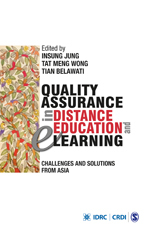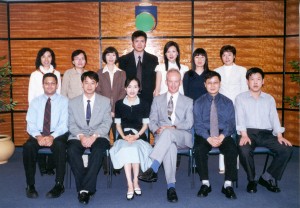A while back Tat Meng Wong and Insung Jung asked me to help out with the final stages of a book they were editing along with Tian Belawati: Quality Assurance in Distance Education and e-Learning: Challenges and Solutions from Asia. I happily obliged and forgot all about it until last week heard a knock at the door and there was the FedEx man with a parcel containing my copy of said book.
 Now I appreciate that quality assurance (QA) isn’t everyone’s favourite topic, and I’ve never been particularly heavily involved, preferring to hover around the wings and do just as much as was required of me. Be reminded, though, that the idea of quality lies at the heart of everything we do (à la Zen and the Art of Motorcycle Maintenance – read it if you haven’t already done so). I used to worry, however, that quality had been taken over by those more concerned with process than the development of a quality culture.
Now I appreciate that quality assurance (QA) isn’t everyone’s favourite topic, and I’ve never been particularly heavily involved, preferring to hover around the wings and do just as much as was required of me. Be reminded, though, that the idea of quality lies at the heart of everything we do (à la Zen and the Art of Motorcycle Maintenance – read it if you haven’t already done so). I used to worry, however, that quality had been taken over by those more concerned with process than the development of a quality culture.
Anyway this new QA book is now available and I’m here to commend it, not just because it’s been published by friends, but also because it contains some good stuff. What good stuff might that be, you ask? Well, no book of this ilk is ever wholly admirable, but there’s enough here to well and truly justify the time and effort that went into its production and for you to at least peruse it.
To be specific, my favourite chapter is that by Naveed Akhtar Malik, Rector of the Virtual University of Pakistan. In particular, the section on the ‘Case Study: Student Assessment System’ (pp. 228-236) showcases the technologically enhanced system that has been developed to cope with large numbers of enrolments. This is cutting edge stuff, a lesson in how to design a quality system that enhances practice, not just monitors it. Without going into detail, rest assured that it tackles the hard stuff in assessment, providing a method of tackling essay-type as well as the easy multiple-choice type questions for examination. Those contemplating how to make their MOOCs more easily assessable would do well to see what the Virtual University of Pakistan is doing.

Proof that I worked at the OUHK. Staff of the Centre for Research in Distance and Adult Learning, circa 2002.
What else is there? Well, having spent eight great years working for the Open University of Hong Kong, I appreciate Bob Butcher’s able summation of the University’s more than two decades of QA experience. It’s a good one if you want to learn how an institution’s QA procedures evolve over time.
Another Asian university with a rich history, Thailand’s Sukhothai Thammathirat Open University, also provides an exemplary case study, in this case detailing the key issue of integrating internal and external QA, along with a close look at the QA system itself.
Other Asian countries with contributions are Singapore, South Korea (x2 chapters), Indonesia, China (x2), Mongolia, Japan, India, Philippines, Malaysia (x2) and Sri Lanka. There’s also a Foreword by the Commonwealth of Learning’s new President, Asha Kanwar, a Preface from the three Editors and a helpful final chapter, ‘Concluding Remarks: Future Policy Directions’, by Insung Jung.
Published by SAGE in collaboration with the International Development Research Centre, it is also available as an e-book.

Sounds a good solid book – and an interesting read. Will check it out.